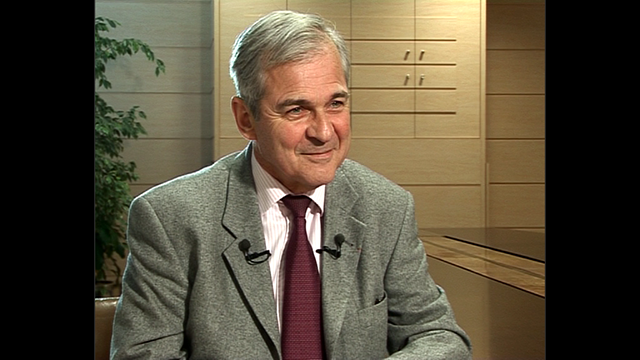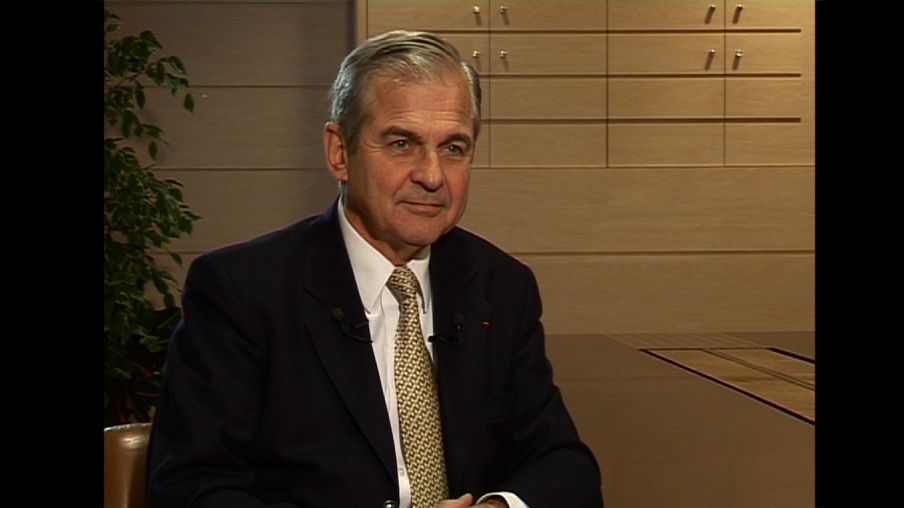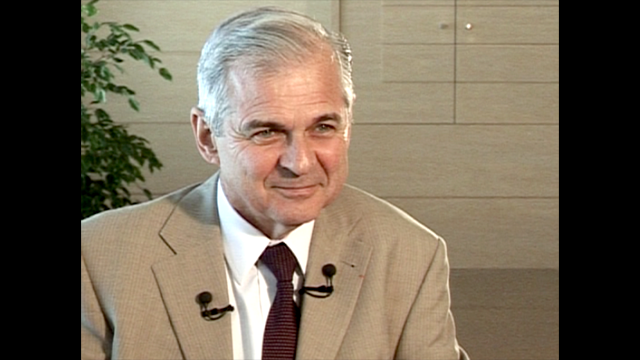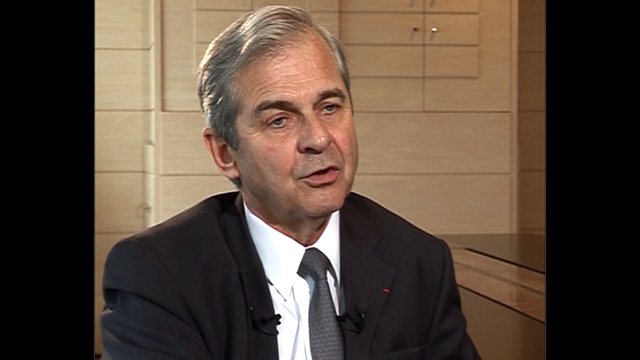EuroBusiness Media (EBM): Technip, one of the worlds' leading oil services companies, just reported third-quarter profit. Daniel Valot welcome, you are the chairman and CEO of Technip, what are your comments on the company's overall performance in the third-quarter?
Daniel Valot (DV): Well it has been a very strong quarter with progress in revenues of more than 20%, progress in net income of more than 60%, so I'm very glad with these numbers. In terms of order intake, it's lower than last year, which was quite exceptional, but altogether we end up with a backlog which is slightly under 11 billion euros, so still a very large backlog. So I'm very delighted by this strong performance we got during the third-quarter.
EBM: Now, admittedly the first half was a bit of a bumpy ride for Technip's share price - you had a profit warning due to an offshore contract, you were experiencing some difficult contract close-out,s and you also told the market that the current high level of activity in the oil and gas services sector was generating bottlenecks in the supply chain. Can you give us a sense of where things stand on these issues today?
DV: Oh, it's more or less the same. The difference is that now we are mid-November -- so obviously it's easier to forecast what will be the full-year than it was in July or April this year. The situation has not changed -- there are still a lot of oil and gas projects coming on the market -- so a lot of bottlenecks in terms of supply chain, and a lot of uncertainty regarding the cost of raw materials, which are jumping each day. So the situation has not changed, but our level of visibility is of course much better because we are pretty close to the end of this year.
EBM: What is your specific update on margin progression in your onshore downstream business?
DV: Well you've seen what happened. The first-quarter of this year we had basically no margin in this segment. The second quarter-showed some margin, the third-quarter is slightly better, and I would assume it would continue this way in the coming quarters as we start implementing the very large contracts which were awarded to us last year. During the first quarters we got revenues but we didn't recognise any margin. Then, we have more progress on these contracts, we start recognising margins in our accounts. So this trend will continue in the coming quarters.
EBM: As you know, the market is very focused on the big LNG contracts you took on last year. What is your update on how these contracts are coming along. Does their level of profitability meet your expectations?
DV: Well, so far so good. On those contracts we are basically progressing the engineering. For the first one of those contracts, which is Quatar Gas 2, the engineering is practically completed now. On procurement, we made a lot of progress -- basically I believe there is no real issue on procurement with those contracts because most of it is now secured -- and what remains in front of us is the main challenge which is construction. As I said before on each one of those three projects in Quatar, we will have a work force at site of between 15 thousand and 20 thousand people, so it's not a very manageable work site. Yemen is a bit smaller, but still it is difficult to get construction progressing well in those countries. So far so good, but we will know better when the projects are completed. What I can say is that the good thing is that, given the good progress we made on engineering and procurement, the provisions we had taken, the contingencies we had taken in our prices, are still there to cover the risks we are going to face on construction.
EBM: Your backlog is stable at a lower level than it was one year ago. What can you tell as about the risk/reward mix of the current backlog versus the risk/reward mix of the backlog as it stood one year ago?
DV: I believe I said before that our policy was to stabilise our backlog -- so that's what you can see from our numbers it's stabilised -- it's marginally lower than what it was one year ago. And the good thing is that we have been able achieve this stabilisation by being more selective on the projects we take than we have ever been before. So we are now able to take projects on which there is a lower level of execution risks, better margins, better contingencies. And altogether I would say our backlog is stable compared to what is was one year ago, but much better quality than what we had one year ago, or two or three years' ago.
EBM: What is your outlook on order intakes for the second-half of this year and the first-half of 2007?
DV: Well, we still have in front of us a number of vary big prospects. It's rather difficult to predict what will be our order intake for the rest of the year because there are two very large contracts which can be either in our backlog by the end of the year or not. And obviously it's difficult for us to predict whether those contracts will be made available before the 31st of December or in the following weeks. But altogether I believe we still have in front of us, on a longer term view, a very, very bouyant market.
EBM: More precisely, the market would like to know your outlook on the timing of certain contracts such as the Khursanyah contract in Saudi Arabia. Is it more likely to come in before the end of this year or early next year?
DV: It's a contract we do have. So there is no question mark on the fact that we have this contract and we are executing it. The question mark is: shall it remain a service contract or will it become a lump-sum turnkey contract, as was the intention of both parties, Saudi Aramco and oursleves, when we signed it ? This transformation into lump-sum turnkey contract was expected to take place a few months ago. We are still discussing with Saudi Aramco. I do hope it will be converted before the end of this year. There are very good signs, showing us that it should be converted into lump-sum turnkey before the end of this year, but then we are two -- so we'll need to have the agreement of the other party to have it done before the end of this year. And that's one of the main reasons why we have some uncertainty on the level of backlog by the end of this year -- because it's a very large piece of business.
EBM: What is your evaluation of your spare capacity ahead of the pick-up in activity that is expected with the large West African deep water projects in 2007?
DV: We still have a lot of capacity. We are basically completing a major project which was Dahlia. Both the FPSO and the UFL portion of this contract are basically completed now. We have completed the Syrian Safire project. So we have a lot of capacity in terms of vessels and people, and so we are going to bid on the large EPC contracts which are expected in deep offshore in West Africa this year and next year.
EBM: Recently we have heard a number of players in your industry make some very positive statements about the long-term prospects of your industry, with Schlumberger for example saying for example that the current high level of the cycle for oil services is sustainable until 2010. What is your outlook on the cycle?
DV: I don't know about this statement by Schlumberger, but I said more or less the same thing more than one year ago. I do believe this level of high spending will continue for at least four or five years, because there is no more spare capacity, be it in production or refining or even petrochemicals, so it will take several years of high level of capital spending to bring back the capacity to what is needed by the world. So I'm pretty confident that this cycle should last until at least 2010.
EBM: Finally, you have announced that you will not seek to renew your mandate as CEO when it expires in April. What are your reasons for leaving and what can you tell us today about your succession plan?
DV: It's very simple. Next year I'll be 63. Our terms in our company are four years. But there is also a provision in the by-laws under which the chairman and CEO cannot be older than 65. So it would not make sense for me being 63 to ask for a new term of four years, knowing that in two years anyway I would have to retire. So that's the reason why I decided to retire. What can I tell you about the successor? Nothing. It's a process which is handled by the nomination and compensation committee. So my understanding is that they are reviewing and examining a number of applications, and I'm pretty confident that they should come up with a name in the coming weeks.
EBM: Daniel Valot, chairman and CEO of Technip, thank you very much.
DV: Thank you.





